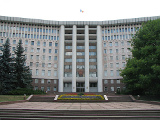Shiny Promises in Moldova Woo West
By Jeremy Druker for ISN
The occasion of the Moldovan prime minister’s visit to Washington was the signing of Moldova’s first aid package through the Millennium Challenge Corp, the US foreign aid agency that closely links assistance to good governance and economic reform. A total of $262 million, spread out over five years, will be spent on improving the agricultural sector and road infrastructure.
But the package was also an early reward for a West-leaning government that has been in power just five months, yet has already ingratiated itself with new friends on both sides of the Atlantic.
As US Secretary of State Hillary Clinton put it, “today’s signing is a victory for governance, human rights, and economic reform,“ which marked a new beginning for relations between the two countries.
The object of the newfound affection is a coalition government that took power this past September after a tumultous year that saw parliamentary elections in the spring result in a Communist victory, widespread charges of electoral manipulation and violent demonstrations that saw dozens of young protestors arrested.
After that, parliament could not elect a president, and early elections in July led toThe Alliance for European Integration, a coalition of four parties that managed to overcome the usual obstacles that had hindered cooperation among the opposition in the past (namely, infighting, ideological differences and opportunism).
The coalition pleged to push market and democratic reforms and bring the country closer to Europe. They have been getting high marks so far, at least for the rhetoric and change in attitude.
As a recent article in the Washington-based German Marshall Fund noted, “The new government has changed substantially the style of politics, communication with the public, and the image of Moldova in the eyes of the international community almost overnight. Neither Moldova nor the West is likely to have a better opportunity under this new government.”
The question now is how long this government will last. In December, parliament failed yet again to elect a president, with the coalition’s candidate blocked by the still-powerful Communist Party. Normally, that would trigger the dissolution of parliament and the holding of early elections later this year.
Some politicians, however, have called for preserving the current parliament for a full four years and for changing the constitution to make it easier to elect a new president.
That has left a dilemma for the West and the coalition itself. On one hand, the US and EU should be wary of once again over-investing in specific individuals, who might not even be in power in a year. And they should be sure to discuss with their partners in Chisinau any potential constitutional changes, even if it would lead to the good guys staying in power for their full term.
On the other hand, the new leaders and their teams in the ministries do need concrete assistance. Many are young and bright, but woefully inexperienced in public policy or institutional reform.
In addition, if elections are in fact held in the fall, the coalition will need some record of performance to ensure that they repeat their success. Until now, many of the government’s supporters have been willing to give them a grace period, but that patience will surely end soon if all the shiny promises don’t lead to specific actions.
That, however, gets to crux of the problem for the coalition. If they can’t be assured of winning the next election, will they really be able to muster all the political will and energy necessary to implement radical reforms? And in the midst of yet another election campaign?

